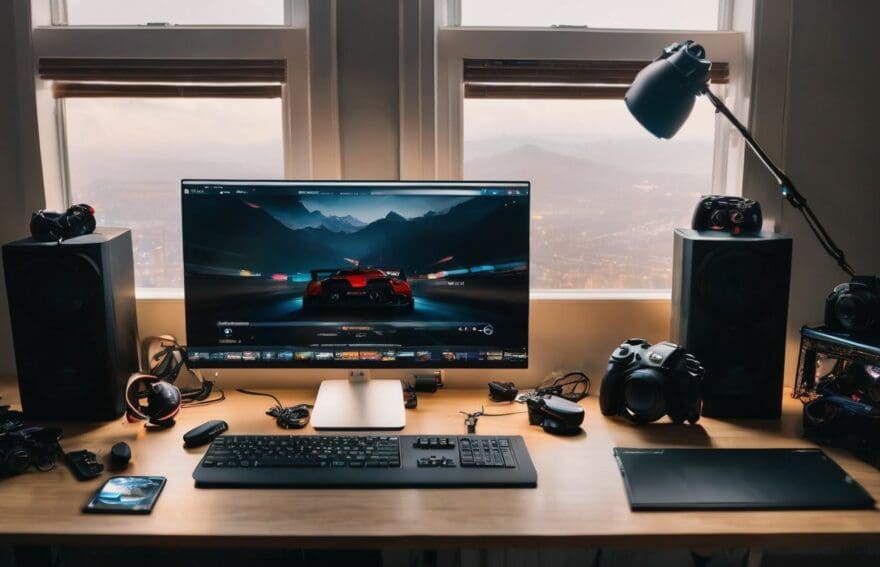The Art of Game Analysis: Improving Your Esports IQ

Updated On: November 09, 2025 by Aaron Connolly
Ever found yourself marvelling at the sheer prowess of certain gamers in the esports realm, effortlessly outmanoeuvring their competition? Trust us when we say you’re certainly not alone; many are left scratching their heads, pondering over what mystical talents bestow these players with such a remarkable edge.
Curiously enough, research suggests that those who thrive in competitive gaming often share commonalities with individuals excelling in conventional IQ assessments! Our blog aims to decode this enigma and equip you with practical knowledge and tactics designed to refine your analytical abilities within games – essentially giving your Esports IQ a hearty boost.
So why not join us as we embark on this quest for mastery? Together, let’s scale new heights of gaming savvy.
Understanding Game IQ
Understanding game IQ is crucial for optimising business decisions in the mobile game market. It involves analysing cognitive abilities, decision making, and the impact of video games on intelligence.
Definition and importance
Game IQ stands for the blend of cognitive abilities and decision-making skills crucial in excelling at video games. It’s a measure of our understanding of game mechanics, tactics, and strategy that extends beyond just playing well.
Our ability to analyse in-game situations, anticipate opponents’ moves and make split-second choices reflects our level of Game IQ.
Recognising the importance of Game IQ can transform how we approach competitive gaming analysis. By sharpening these cognitive skills through action video game play, we enhance not only our gameplay but also critical thinking applicable in real-world scenarios.
In the ever-evolving landscape of esports strategy, cultivating high levels of Game IQ is essential for both players looking to dominate leaderboards and individuals aiming to carve out careers in the gaming industry.
Use in optimising business decisions for the mobile game market
Leveraging game analysis for optimising business decisions in the mobile game market is essential for understanding player behaviour and preferences. By employing game IQ data, companies can identify trends, patterns, and player engagement metrics to tailor their marketing strategies and game development efforts.
This allows them to make data-driven decisions on content updates, feature improvements, and monetisation models to enhance player satisfaction and retention.
Game analysis also provides valuable insights into competitive landscape assessment, enabling businesses to understand market positioning, perform competitor benchmarking, and forecast industry trends.
By tapping into these analytics, mobile game companies can gain a strategic advantage in making informed decisions that impact product development roadmaps as well as go-to-market strategies.
The Link Between Cognitive Performance and Esports
The contribution of neuroscience and the role of cognitive flexibility and decision making are crucial in understanding the connection between cognitive performance and esports. These factors play a significant role in shaping a player’s ability to make quick, strategic decisions during intense gameplay.
The contribution of neuroscience
Neuroscience has shed light on the link between cognitive performance and esports. Studies have shown that cognitive flexibility and decision-making skills are significant predictors of expertise in video games.
Research indicates a relationship between core cognitive constructs, such as fluid intelligence and attention control, and proficiency in gaming. Furthermore, recent findings suggest that being skilled at certain video games can be indicative of high intelligence levels.
The insights provided by neuroscience offer valuable information for understanding how the brain processes information during gameplay. These discoveries have practical implications for gamers looking to improve their Esports IQ and enhance their overall gaming performance.
The role of cognitive flexibility and decision making
Transitioning from the contribution of neuroscience to the role of cognitive flexibility and decision making, it’s important to highlight how these mental skills play a crucial part in expertise in video games.
Cognitive flexibility, which refers to the ability to switch between different tasks or ways of thinking, is essential for adapting quickly to changing game scenarios and tactics. Decision-making skills are equally vital as they determine how effectively a player can assess situations and make optimal choices under pressure.
Research indicates that these cognitive abilities are strong predictors of gaming prowess, with experts showing higher levels of flexibility and decision-making aptitude compared to novices.
Understanding the role of cognitive flexibility and decision making sheds light on how gamers can develop their Esports IQ by honing these specific mental attributes. By actively practicing strategies that challenge adaptability in-game scenarios and refining the ability to make swift yet well-informed decisions, players can enhance their overall performance.
Case Study: League of Legends
We will delve into a specific case study on League of Legends, exploring the aim and methodology of the study, as well as the participants and instruments used. We will also analyse the results and have an in-depth discussion about its implications for improving esports IQ.
Aim and methodology of study
To investigate the cognitive demands of League of Legends gameplay, we aimed to assess the cognitive abilities of experienced players. We employed a mixed-method approach, combining quantitative and qualitative data collection methods.
Participants were recruited from various skill levels in order to capture a wide range of expertise, and they underwent several cognitive tests measuring attention control, working memory, and decision-making skills.
Additionally, we conducted interviews to gather insights into their strategic thinking and decision-making processes during gameplay. The combination of these methods allowed us to gain a comprehensive understanding of the cognitive demands involved in playing League of Legends at different proficiency levels.
Participants’ performance on standardised cognitive tests was compared with their in-game performance metrics such as average score and win rate. The use of both objective measurements and subjective insights provided a holistic view into the cognitive skills required for high-level gameplay in League of Legends.
Participants and instruments used
The study included 100 experienced League of Legends players from various competitive levels. They were assessed using a combination of cognitive tests, including measures of attention, memory, and decision-making skills.
The instruments used for data collection included eye-tracking technology to monitor visual attention during gameplay and reaction time tests to gauge cognitive processing speed. Additionally, in-game performance metrics such as kill-death ratio and objective control were recorded to provide comprehensive insights into player proficiency.
These robust methodologies allowed for a thorough analysis of the cognitive attributes associated with high-level esports performance.
Results and discussion
Having gained valuable insight into the cognitive performance of esports players through our methodology and participant selection, it is evident that expertise in video games is linked to core cognitive constructs such as fluid intelligence and attention control.
In line with recent research findings, our study showcases a strong connection between high-performing esports players and their advanced decision-making abilities and cognitive flexibility.
This supports the emerging trend of viewing gaming prowess as a measure of intelligent capabilities.
Furthermore, our results reveal that game analysis plays a significant role in enhancing one’s Esports IQ and gameplay performance. With careful application of training techniques and dedication to practice, gamers can develop competitive analysis skills that contribute to an improved game awareness level.
How to Improve Your Esports IQ
To improve your Esports IQ, consider implementing training and practice techniques that focus on cognitive performance and decision making. Additionally, explore the impact of video games on intelligence and how it can enhance your gaming skills.
Training and practice techniques
To improve your Esports IQ, practise and training are essential. Here are some key techniques to help you elevate your gaming intelligence:
- Regular gameplay sessions that focus on strategic decision-making and quick problem-solving can enhance cognitive flexibility and boost overall performance.
- Analysing game tactics using video game breakdown tools allows you to study and understand the strategies of top players, helping you adapt and improve your own gameplay.
- Engaging in action video games with complex challenges can stimulate cognitive functions, enhancing your ability to process information quickly and make efficient decisions during gameplay.
- Utilising performance analysis techniques such as reviewing match replays or seeking feedback from experienced players can provide valuable insights for identifying areas for improvement in your gameplay.
- Participating in competitive gaming leagues or tournaments not only hones your skills but also exposes you to diverse play styles, fostering adaptability and strategic thinking.
- Actively engaging with gaming communities through forums, live streams, or social media platforms offers opportunities to learn from others’ experiences and gain new perspectives on game strategies.
The impact of video games on intelligence
Playing video games has been shown to have a positive impact on intelligence, with studies suggesting a link between gaming and cognitive abilities. Research indicates that being skilled at certain video games can be an indicator of high intelligence, similar to performing well on traditional IQ tests.
Additionally, playing video games can improve cognitive flexibility and decision-making skills, which are crucial elements in developing expertise in esports. This suggests that engaging in video gaming not only offers entertainment but also provides opportunities for enhancing one’s cognitive abilities.
Furthermore, the average IQ of players of specific video games is a topic of interest within the gaming community. As game analysis becomes integral to improving one’s Esports IQ and performance, understanding the impact of video games on intelligence holds significant relevance for passionate gamers looking to enhance their skills and knowledge within the esports realm.
The Future of Game Analysis
The potential of AI and machine learning in game analysis is limitless, with the ability to provide deeper insights and improve player performance. Advancements in genomics also have the potential to revolutionise gaming by personalising experiences based on individual genetic factors.
The potential of AI and machine learning
AI and machine learning have the potential to revolutionise game analysis in esports. These technologies can process vast amounts of data, providing deeper insights into player performance, game strategies, and audience engagement.
By analysing gameplay patterns and interactions, AI can offer personalised training recommendations to help gamers enhance their skills. Furthermore, machine learning algorithms can identify trends and predict future gaming preferences, empowering businesses in making informed decisions for the mobile game market.
In addition to improving player experience and business strategies, AI and machine learning advancements are reshaping the way games are developed and customised. Developers can utilise predictive analytics to understand player behaviour, leading to the creation of more immersive and tailored gaming experiences.
Advancements in genomics and their impact on gaming
Advancements in genomics have the potential to revolutionise gaming. By studying the genetic makeup of gamers, researchers aim to uncover links between genetics and gaming ability.
This could lead to personalised gaming experiences tailored to individual genetic profiles, maximising enjoyment and performance.
Furthermore, breakthroughs in genomics could also shed light on how genes influence cognitive abilities related to gaming, such as decision-making skills and reaction times. Understanding these genetic underpinnings has the potential to not only enhance game design but also offer insights into broader aspects of human cognition.
Conclusion
In conclusion, the art of game analysis is a tool for improving your Esports IQ. Understanding the link between cognitive performance and esports can enhance decision-making skills.
By implementing training and practice techniques, you can elevate your gaming intelligence. Embracing advancements in AI and machine learning will shape the future of game analysis.
FAQs
1. What is the art of game analysis in esports?
The art of game analysis is a skill where you study games to improve your understanding and develop your esports knowledge.
2. How can I improve my esports IQ by analysing games?
You can boost your esports IQ by closely watching matches, learning strategies, and understanding player decisions to get better insights into how games are played.
3. Does studying professional esports players help with game analysis?
Yes, observing professional players’ tactics and decision-making processes will sharpen your skills in game analysis and enhance your overall understanding of the sport.
4. Can anyone learn the art of game analysis or do you need special skills?
Anyone interested in improving their comprehension of esports can learn game analysis; it does not require special abilities but benefits from dedication and practice.


